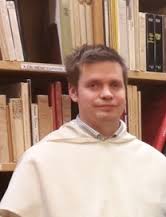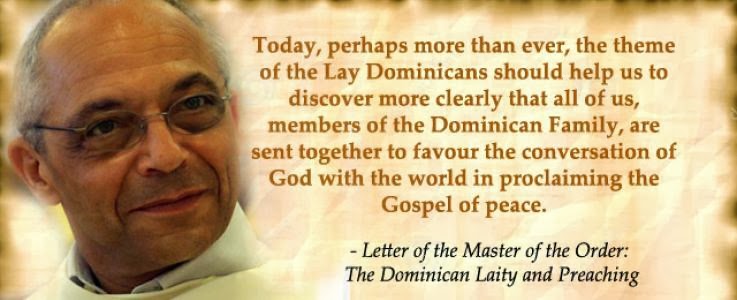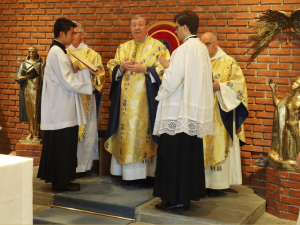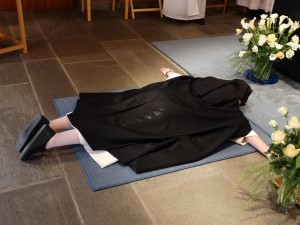Fredag 8. august avla vår medbror Gabriel sine evige løfter i St Dominikus kloster. Det ble en vakker og høytidsstemt feiring, verdig den store gaven løftene er for den dominikanske familien og for kirken. Under følger noen bilder fra avleggelsen, og nederst finner dere prekenen holdt av fr Antoine Levy OP.
(Alle bilder: Katarinahjemmet)
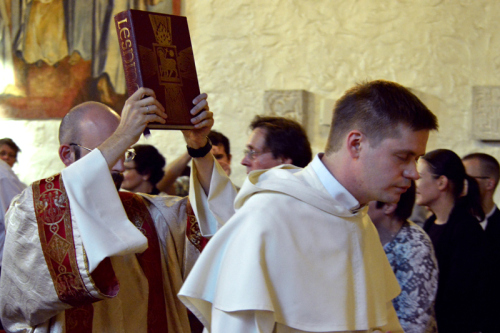
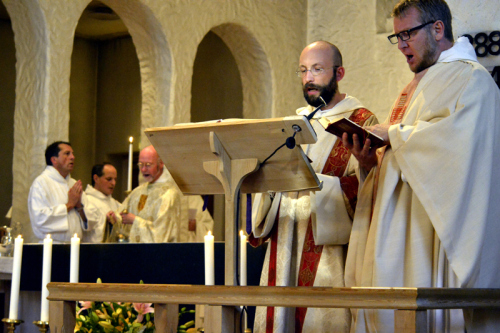
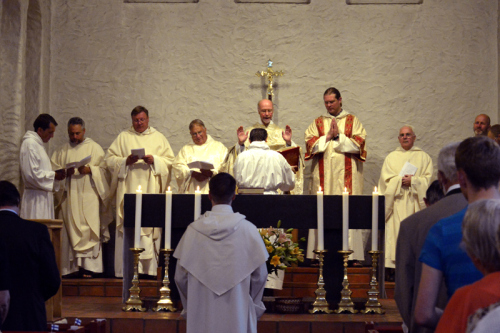
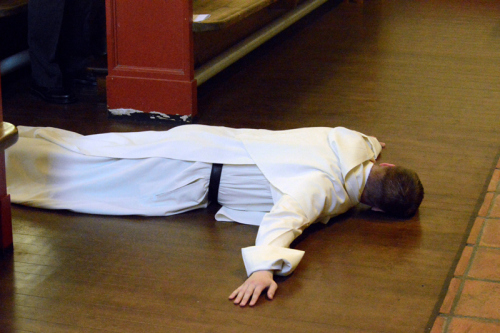
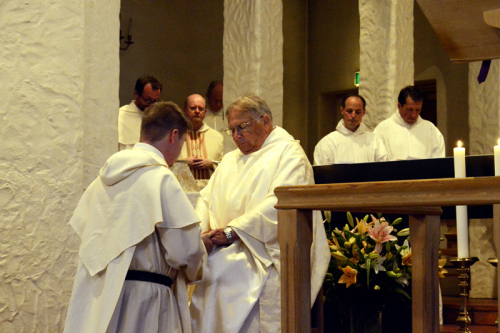
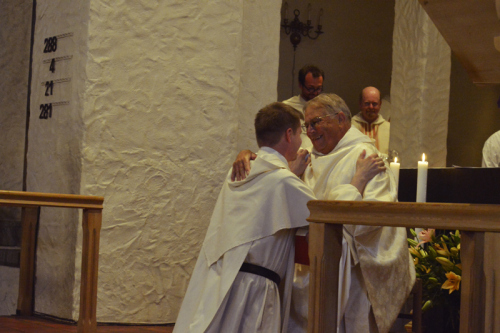
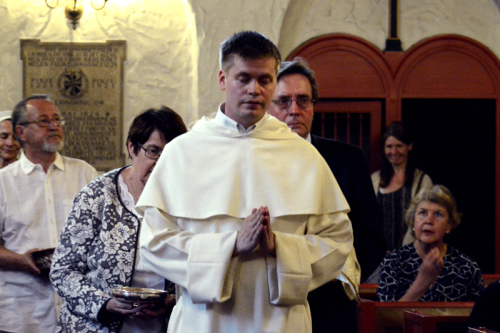
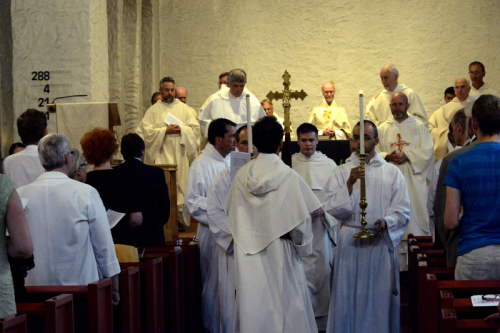
Homily for solemn profession for fr Gabriel Salmela
by fr Antoine Levy OP, Studium Catholicum in Helsinki, Finland
Right or wrong, Finns have the reputation of being a slow people. But there is a particular group of Finns, an ancient Finnish tribe, that all the other Finns consider to be slow. They are called the Hämeläiset, a number of whom live in the region of Tampere. For those who have never set foot in hämeläinen territory, I leave to your wildest fancy to imagine what the pace of life is like out there. I have lived with someone from that region for a year. I might spend a few more years in his company. Now let me tell you a secret: the Hämäläiset are not slow. They are simply cautious or circumspect. They take the time to weigh things up. Today, as we celebrate the feast of St Dominic, the one I just mentioned happens to make his solemn profession in the Order of preachers. We are gathered around him on that occasion. This is a good opportunity to share my deepest conviction with him: my dear Gabriel, you do well to be circumspect. You had better be. Today, you are giving your life to God in the Order of St Dominic. And yet it is far from obvious that the Order of St Dominic is the best place to consecrate one´s existence to God. We are now on the eve of celebrating the Order´s 800 year- jubilee. It is certainly the sign of a respectable religious brand. But it would be vain to pretend that the ship of our Father Dominic, the one that Catherine of Siena once described as “governed with a perfect rule, attentive to the honor of God and to the salvation of souls with the light of learning” has remained unshattered since it has started sailing on the troubled waters of the Modern age. We are no longer the spearheads of a flourishing civilization. We can hardly boast of spectacular achievements as of late. We are a drop in an ocean which has become very much foreign to us, no matter how hard we have tried to look like all the other drops. Too many questions, it seems, for the few answers that we might bring. Or is it that there are too many answers around us and too few questions that we dare to ask?
As a good hämäläinen, you took the time that you needed from your first tentative approach of the Order to the present day. As the formula goes, you came to learn about the mores, the concrete ways of life, of our Order, which, I surmise, was not exclusively an occasion of pleasant surprises. Meanwhile, to carry on with the same formula, the Order came to know about your mores, your concrete way of life, which, as far as I know, did not go without some measure of cultural adjustment. The outcome of this time of reflection and sometimes of trials is the joy of this day. Today, the Order, and together with it the brethren, the sisters that are here as well as all the friends of the Order are immensely happy to welcome you as their brother for good, their brother forever. Actually, we are not only happy. We are grateful. We thank you from the bottom of our hearts for this confidence that has triumphed over all manners of doubts, hesitations and sometimes wounded memories. It means that, in spite of all this, you have found in the Order, frail and poor as it might appear in our days, what you were looking for. As so many before and around you, you somehow got an inner confirmation that the insight that had led Dominic to found it was still alive, still kicking and biting, after almost 800 hundred years of existence.
How one does even get the insight that such an insight might exist, so as go in search of it in the first place? It is difficult to say. It probably starts at a very early stage in one´s life. It is the suspicion that this our world, with all its brilliant answers, has brushed a few questions under the carpet, and that these questions happen to be those that matter most. It is the feeling that, as much as this world teaches you about truth, it is still entangled in a half-lie. It is the quest for another point of view, a point of view which would radically question the answers the world is filled with while showing the utmost concern for whatever truth and beauty the answers it brings forward contain. The very idea that a religious Order founded 800 years ago might give access to such a point of view is in itself a provoking question directed at our present way of thinking. How could a medieval insight make us understand something about our world that our world, with all its science, would be unable to understand about itself? It is impossible as long as we call medieval an insight which, in actual fact, has nothing to do per se with the Middle Ages. There is indeed something which, provided it exists, is superior to the latest stage of human knowledge -and will forever remain such. It is the wisdom of God, which, to the extent in which it exists, should be conceived as simultaneously motionless, eternal and more alive than any created mode of living thing. It also pertains to the notion of God´s wisdom that only God can grant access to it. Further, it is not unreasonable to think that God, provided He exists, is willing to share something of his most intimate being, something of the life-giving Wisdom which is the gift of his three-personal life itself, with the one He finds willing to give his or her own life to Him.
Since its establishment, the purpose of monastic or religious life has been this intimate conversation with God. One lives alone, monos or without family according to the flesh, in order to dedicate oneself exclusively, monadically to the one and only true God, something which in turn is possible only in the midst of a spiritual family of brothers or sisters. At the very heart of the Middle Ages, Dominic had the insight that what the world around him -a world for a good part composed of illiterate and perplexed Christians-needed most was a word that would come out of this intimate conversation. Moreover, he had the intuition that the world would always need such a word, for the good reason that, be it Christian or post-Christian, the world would always remain in a state of perplexity without such a word.
You are well prepared to realize that this our world, the world we live in and so many aspects of which we happen to cherish, is far from being keen on receiving the word that it needs so much to hear. If something is typical of the present age, it is the presumption that it has the ability and the duty to tell who God is. We have almost totally lost from sight the idea that is the job of God to tell us who we are and not vice-versa. Standing on the fault line of modernity is definitely a bold undertaking. In your own country, you will necessarily be perceived as the voice of this heartless, rigid, scandalous and, most important or pernicious of all, foreign machinery called the Catholic Church. You will be unable to explain or rather to make people around you believe that your Church has a heart, and that this heart is not a dry set of doctrines but this very wisdom of God I am talking about, boundlessly varied in its manifestations as well as unfathomable in its unity. And still, you will need to heed the apostle who “urges us to proclaim the message; be persistent whether the time is favorable or unfavorable; convince, rebuke, and encourage, with the utmost patience in teaching”. By so doing, you will increasingly be conformed to the one insight, the one conviction that has guided Dominic all the way, namely, that it is worth facing all these obstacles because, beyond these obstacles, there are people- real people. There are souls and hearts that are desperately in need, knowingly or not, of hearing the word that you are carrying to them. “The harvest is plentiful, but the laborers are few; therefore ask the Lord of the harvest to send out laborers into his harvest”. If the word you carry within you comes from God, it will necessarily surprise and question the people who will hear it, which in turn will almost inevitably bring about hostile reactions. But if this word comes from God, it will also give you the strength you need to withstand. “Go on your way. See, I am sending you out like lambs into the midst of wolves.” As you are facing wolves, rely on the Shepherd who watches over his lambs. What you should be concerned about is whether the word you carry really comes from God. If it does, it will begin and end as a word of peace. “Whatever house you enter, first say, ‘Peace to this house!’. Be constantly aware that your word is not truly the word of God if it cannot finally and entirely be summarized with the following words: ‘The kingdom of God has come near to you.’
Dear Gabriel, it is this intuition, an almost 800 year-old intuition, that has led you all the way here. Like the star of Bethlehem, the very one that shines on the forehead of Dominic in the painting of Fra Angelico, it has gently illuminated your path up across the mountains and deep down through the valleys of a Dominican calling. Today marks the victory of confidence over diffidence in the heart of a more or less genuine hämäläinen. Today, you are joining the coetus pauperum, the gathering of the poor sons of Dominic for good. Their common treasure is the very intuition that made you join them. As you embrace today Dominic´s way of evangelical poverty, they receive you and you receive them. With their weaknesses, and God knows how strong these are, each one of them embodies in his own way an aspect of this boundlessly rich intuition. They will help you to deepen and manifest your own share of this spiritual treasure to the extent in which you will help them to do the same thing. Together, we will grow in the mercy which, after them and so many others, you will ask and receive today from God and from the Order. Yes, this gathering of the poor is a fragile bunch. And God knows how one feels frail and vulnerable when confidence, this parcel of old Abraham´s emuna, is the only thing which is left as one sets off on the part of the journey that still lies ahead. But if you are here, it is because you have realized it by now, after a reflection that has taken a while to reach its conclusion. One should not be afraid of weakness and frailty, neither in the others nor in oneself. Those are the very things that God asks from us in order to be able to perform his marvels once again. Today, God looks right into your frailty, your weaknesses and you limits. What He sees is a loving heart, and that is all that matters to Him.
How beautiful upon the mountains
are the feet of the messenger who announces peace,
who brings good news,
who announces salvation,
who says to Zion, “Your God reigns.”
Isaiah 52:7
